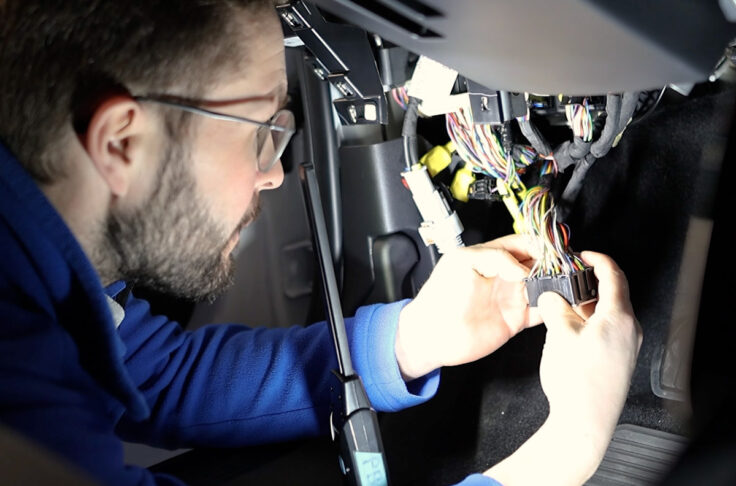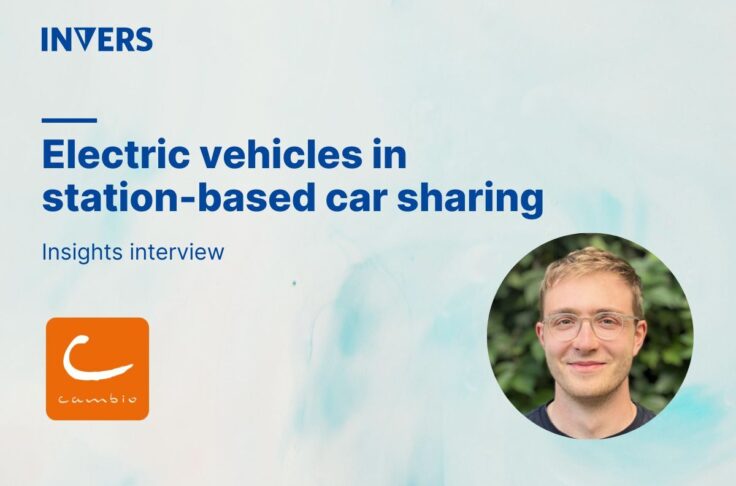
Invers Mobility Barometer reports 14% fleet size growth in European car sharing market

Out now: The fourth edition of the Invers Mobility Barometer focusing on “European Car Sharing 2024” is now available, providing an in-depth analysis of free-floating, station-based, and peer-to-peer car sharing across Europe. Key findings include:
(1) Over 580 car sharing operators provide services in 39 European countries.
(2) The number of vehicles in free-floating and station-based car sharing has risen to at least 120,000, marking a 14% increase from 2023.
(3) Germany, France, the Netherlands, Belgium and Italy host the largest aggregated station-based and free-floating fleets.
(4) More than 360 vehicle models from more than 55 brands are in use.
(5) Emerging trends highlight regional business model specifics, ongoing electrification, a focus on profitability and operational excellence, and advancements in car sharing technology such as tele-driving.
Siegen, November 5th, 2024 – The latest edition of the Invers Mobility Barometer takes a look at key car sharing business models: free-floating, station-based and peer-to-peer. Building on the proven structure of previous reports, this edition incorporates current, country-specific research, published data, and insights from interviews with market experts, alongside Invers’ own research. “Our new report marks the largest European market we’ve ever tracked for both free-floating and station-based car sharing”, says Barath Devanathan, Chief Business Officer at Invers. “The past few years have seen a sustained period of growth and success for operators.”
1. Over 580 car sharing operators provide services in 39 European countries.
This edition of the Barometer reveals the largest European car sharing market so far seen. The majority of operators run station-based car sharing systems, with over 460 such operators identified across 24 countries. In other words: Four out of five identified operators run station-based systems, sometimes also called round-trip car sharing. Additionally, the analysis identified 80 operators in 29 countries that run free-floating systems and more than 35 operators in 28 countries that run peer-to-peer systems.
2. The number of vehicles in free-floating and station-based car sharing has risen to at least 120,000.
For the first time, Europe’s free-floating car sharing fleet size has surpassed the station-based fleet. This means that, on average, free-floating operators manage significantly larger fleets than station-based counterparts. Currently, it can be estimated that there are 63,000 free-floating vehicles and 57,000 station-based vehicles across the continent. This marks the largest market ever for either business model.
3. Germany, France, the Netherlands, Belgium and Italy host the largest aggregated station-based and free-floating fleets.
In terms of total numbers, Germany leads the European market with 43,100 vehicles. The free-floating market is dominated by a few operators, while the mature station-based market is extremely complex and heterogeneous. France has a combined station-based and free-floating car sharing fleet of 13,500 vehicles, making it the second largest European market, followed by the Netherlands with 7,000 vehicles, Belgium with more than 6,500, and Italy with 5,900. Among these top five markets, Belgium and Germany have the highest car sharing density, with more than 5 car sharing vehicles per 10,000 inhabitants.
4. More than 360 vehicle models from more than 55 brands are in use.
The variety of car sharing vehicle types and models found among European operators is vast. The research identified more than 360 vehicle models from 55 car brands in station-based and free-floating car sharing systems. Often used models include the Opel Corsa, Renault Zoe, VW ID.3, Toyota Yaris, Ford Fiesta, VW Golf, Citröen C3, VW Polo, Audi Q2, Fiat 500 and Renault Clio. Increasingly, also vans and campers are used in car sharing. Popular models include the VW Crafter, Renault Kangoo, Ford Transit, VW T6, Peugeot Boxer, Mercedes Vito, Opel Movana, Fiat Talento and Nissan NV200. The peer-to-peer car sharing market also exhibits an extremely high diversity of vehicle models. Although not quantified in this report, due to the nature of the business model, the number of vehicle models available in peer-to-peer car sharing is even higher than in station-based and free-floating car sharing.
5. Emerging trends highlight regional business model specifics, ongoing electrification, a focus on profitability and operational excellence, and advancements in car sharing technology such as tele-driving.
While station-based car sharing has historically been strong in Northern and Western Europe, free-floating car sharing is the most common model in large parts of Eastern and Southern Europe. Fleet electrification continues to grow in many countries, with car sharing fleets continuing to be significantly more electrified than private/owned car fleets across most markets. Approximately one in four station-based and free-floating operators operate all-electric fleets. As the market matures, operators are increasingly focused on profitability and operational excellence. Additionally, the car sharing market is witnessing prominent mergers and acquisitions, particularly in the free-floating and peer-to-peer segments, which are more dynamic than the station-based market. Finally, evolving technologies solutions such as tele-driving for vehicle delivery and pickup and AI-based damage detection are attracting interest from some car sharing operators.
The Invers Mobility Barometer Vol 4 “European Car Sharing 2024” can be downloaded here.
About Invers
Invers enables car sharing operators to launch and operator fleets at scale with integrated hardware and software solutions. As the inventor of automated vehicle sharing, Invers is developing and reliably maintaining the fundamental building blocks to offer its customers cost-efficient and easily implementable technical solutions.
The company acts as an independent and reliable partner for operators of services such as car sharing, rental and car subscription services with the vision to make the use of shared vehicles more convenient and affordable than ownership. Customers include Cambio, Flinkster, Free2Move, Getaround, GreenMobility, Miles, MyWheels and Zity. The company was founded in 1993 and has locations in Siegen, Cologne and Vancouver. www.invers.com


